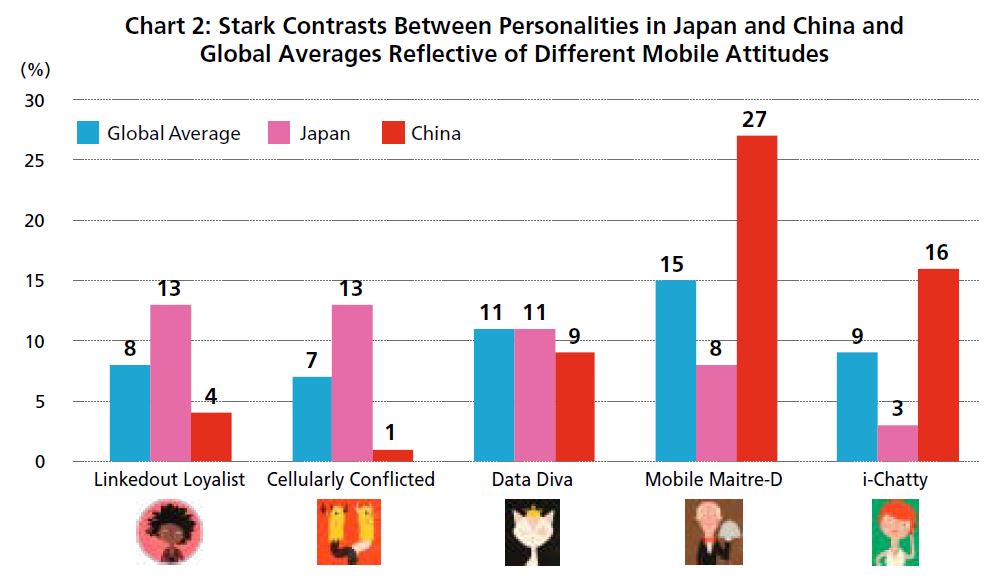Japanese Go Online More and More
CONTENTS
Online Percentage of Japanese People
By D. McCaughan
So how connected are you? In the previous column, I introduced the results of the “Truth about Connected You,” -- a global study into the way people use and think about their mobile and digital connections and how these things are changing and forming their personalities – conducted by McCann Truth Central, a global thought leadership group. I then challenged readers to go on-line themselves and answer a five minute quiz about their own digital habits. The result is that you are categorized into one of 16 “connected profiles” that separate people through their attitudes to mobile and digital life. Of course such segmentations are always a little arbitrary and you may not agree with what it says about you. However for marketers it does allow us to quickly get an idea as to how the population is split on an issue, how populations may differ across borders and the type of messages that might be needed.
Connected Personality Profiles

In the study we asked over 1,000 people between 15-69 years of age in each of nine countries including the USA, China and Japan to complete the connected you profile test.
Chart 1 shows the percentage of people globally falling into each of the 16 profiles and the percentage in Japan. Note some considerable differences. In fact, we found that among the nine countries Japan perhaps deviated the most from the “global norms” in terms of which profiles were most prevalent. So we dug further and to give you a better idea of the differences. Chart 2 illustrates the five profiles where Japan scored most differently from both the global total and from China. You can also read the five profile descriptions as well in the boxes on these pages.
Note for example that the “Mobile Maitre-D” represents 15% of the global population, a huge 27% of China but only 8% in Japan. These are people who literally live and breathe via their mobile phone. They believe that it is their organizer, and without it their lives would be lost. Or consider the “i-chatty” profile which 9% of people around the nine surveyed countries, 16% in China and yet only 3% in Japan. It describes people who are constantly communicating via their mobile, even when in the bathroom. Both of these profiles would seem to be true in a mobile crazy Japan as much as anywhere.
People Rely on Cellular Phones

It is true we encounter people like this all the time. The “Data Diva” for example is as is the case in most countries one of the largest groups at 10-11% and represents people who are usually running two, three or more conversations at once, maybe balancing multiple devices and seemingly to manage it all effortlessly. However we also notice a wide-scale reticence to “only rely on my keitai.” The Truth about Connected You study also found that people in Japan of all ages, and especially those over 40, which of course is now the majority of the country, all use mobile phones constantly and in fact see them in some ways not so much as tools but as extensions of themselves. However they also feel they are only “a part of me, not the whole me” (as a man in early 40s explained).
This is perhaps why we see so many “Cellularly Conflicted” people in Japan: a very large 13% of Japanese versus 7% globally and only 1% in China. Perhaps as I alluded to in my last column because Japanese people have had the most advanced mobile phones in the world for well over 20 years, they have learnt to be more retrospect in their expectations. Perhaps because as a culture there is still more emphasis on “reading the atmosphere” and “fitting in,” Japanese people have totally embarrassed mobile phones as a part of their lives and indeed their being, but worry about whether they are letting go of the full sense of connection by overusing them.
Linkedout Loyalists Group Are in Japan
Which is perhaps why “Linkedout Loyalists” were the single largest group in Japan. They represent 13% of Japanese people, compared to just under 8% globally and 4% in China. They are people for whom voice communication remains more important than SMS and messaging. For whom their mobile and digital communications are important but should never make them sacrifice an in-person, human touch.
As I said these profiles are both fun and at the same time a little arbitrary. However they do say a lot about the changing nature of cultures. China is of course one in which people focus on opening up personal possibility. In previous studies we have noted that the populations of fast growing economies are much more bent on making as many connections as possible, being seen and heard as much as possible and considering long term results second to achieving things now while the opportunity is there. On the other hand our research continues to point out that Japan may be the most technologically advanced culture on earth, people may have fully integrated technology into their lives but context, social constraint and conformity are still placed more emphasis on for not being misunderstood and human to human contact. And so our “Loyalists” and “Conflicted” personalities remain the key forces in marketing considerations.
Oh and for what it’s worth, after living in Japan for nearly 10 years it appears I too am a cautious “Linkedout Loyalist.”


